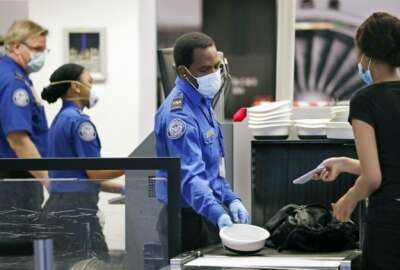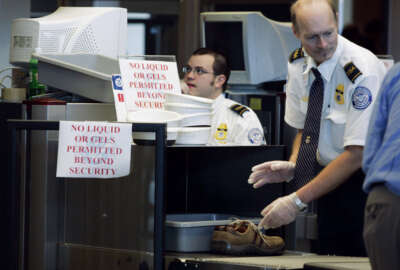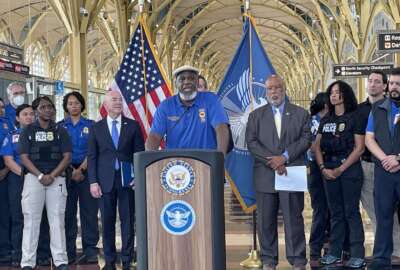Hubbard Radio Washington DC, LLC. All rights reserved. This website is not intended for users located within the European Economic Area.
On Air: Federal News Network
Trending:
This career TSA lawyer focuses on everyone else’s career
Americans probably interact with employees of the Transportation Security Administration (TSA) more than those of any other agency. Behind that workforce are pe...
Americans probably interact with employees of the Transportation Security Administration (TSA) more than those of any other agency. Behind that workforce are people you don’t see as much. One of them has been honored with the Outstanding Senior Executive Professional of the Year award from the Senior Executives Association. the Federal Drive with Tom Temin spoke with Jennifer Ellison, TSA’s Deputy Chief Counsel and former assistant chief counsel for employment, civil rights and labor policy.
Interview Transcript:
Tom Temin Your career at TSA has really been characterized by dealing with the TSOs and the issues of the officers that form the core of the agency. Fair to say?
Jennifer Ellison Yes, absolutely. We handle all employee issues from hire to retire and all of the security professionals, including the transportation security officers.
Tom Temin And I want to go backwards in time to when they were negotiating the very first contract. I think this is after they voted to become part of the AFGE. If I recall correctly. It was some contention. It took some time to get that established. What did it look like from your standpoint as negotiating on behalf of the agency?
Jennifer Ellison I see it in sort of ten year segments. For the first ten years of TSA’s existence. There was no collective bargaining. The administrators at that time decided that we were a new agency and it wasn’t appropriate at that time. However, in 2011, the administrator decided to have limited collective bargaining and limited exclusive representation and the non supervisory TSOs elected to have AFGE as their exclusive representative. And we entered into negotiations with them. And in 2012 we achieved the first collective bargaining agreement for TSA and its TSOs, which was really an exciting time participating on that team. We all bonded for sure doing that for the first time for the agency, and I think it was just successful. And then after that, I proceeded to set up a labor policy group in Chief Counsel’s office to handle all of those issues in partnership with our human capital office.
Tom Temin What were the big issues in that negotiation? What is it that the agency needed to have, and what is it that the union and the employees most needed to have?
Jennifer Ellison Well, you know, for the agency, of course, security is paramount. And, you know, that was paramount for the employees and the union as well. The union officers are TSA employees, and we’re all heading toward the same goal of ensuring mission accomplishment. You know, so some of the limited issues that we had for bargaining the first time were shift bids, annual leave bids, shift trades, things like that.
Tom Temin Got it. Because, yeah, I mean. We should probably pause here, and say that the job of TSO (Transportation Security Officers) is a lot harder than it looks to the public, isn’t it?
Jennifer Ellison It absolutely is. You have to know all the standard operating procedures. You’re dealing with passengers all day long. And, you know, there’s a lot to know and a lot to do. There’s a rotation throughout the different functions of a screening officer. So there is a lot.
Tom Temin Yes. And they’re you know, they’re staring at screens and looking for things. I flew the other day and caught the officer giving a big yawn when my backpack went through. I said, Oh, honey, don’t yawn now. I mean, there’s stuff you got to look at in there. But it came through and she you know, you can tell how hard they work and how long and difficult it is to stare at those screens. And then more recently, there has been a new framework caused by Congress’ agreeing that TSOs should be paid more in accordance with the GS schedule, which does not apply at TSA, but the equivalent. What was that all about? And also, what are some of the other elements of the workforce experience that Secretary Mayorkas has wanted to bring to TSOs?
Jennifer Ellison So I love talking about our new compensation plan because it was so monumental and so important for the workforce and for the agency. Secretary Mayorkas, in June 2021, issued a memo that outlined workforce initiatives for TSA. Historically, TSA has not been able to keep up with the general schedule because we weren’t funded for that. We weren’t funded for pay increases commensurate with the general schedule, like within great increases. So as a result, employee pay kept falling behind comparators in the federal government and of course it created recruitment and retention issues and morale issues and the like. So after the Secretary issued that memo, we worked to develop the pay plan, worked through the budget process, the justifications, all of that. And Congress approved funding for the pay plan was included in the FY 23 omnibus appropriations, which was signed this past December. And so in July we were able to implement the new pay plan, bringing the salaries of TSA workforce to a level equal to their federal counterparts. So this was never, you know, an effort to get something extra. This was to bring us up to the level of federal comparators for the important work that our security professionals do to accomplish the mission each and every day.
Tom Temin But you had the funds from Congress as well as the mandate to do that. So it wasn’t like you had to go scrounging elsewhere to pay for an increase that Congress had demanded.
Jennifer Ellison That’s right. Congress provided the funding and the appropriations. And, you know, this initiative was just so important for all segments of the TSA workforce. So we talk about the TSOs, who we see at the airports every day. But like you said at the start of this, there are other people behind that as well, other security professionals, the federal air marshals, K-9 handlers, explosive specialists, inspectors, cybersecurity specialists, intelligence analysts. And I can keep going, you know, everyone that contributes to our security mission. This pay plan was really, really important.
Tom Temin We’re speaking with Jennifer Ellison. She’s deputy chief counsel at the Transportation Security Administration and outstanding Senior Executive Professional of the Year. As cited by the Senior Executives Association. And you have a long time in Labor relations, labor policy, compared to what you understand of your counterparts say in the private sector or even in agencies that have the GSA schedule. What are the challenges in labor work for a Federal agency such as TSA?
Jennifer Ellison Yeah, So I would say that, you know, pay was so fundamental. You know, at the basic level, it’s life changing for each individual employee. And no matter how committed to the mission you are, you still need fair pay. Right. You still need fair pay commensurate with your work as a federal security professional. And, you know, for mission accomplishment at the agency, you don’t want to lose experienced security professionals because TSA isn’t able to compete with the federal agency next door. So this was just so important for us. You know, we’ve had attrition and morale issues due to the pay. So the new pay plan will enable TSA to better recruit and retain top candidates. It’s also going to free up some resources because when you’re constantly in a cycle of recruit, hire, train for significant numbers of employees, takes a lot of resources that could otherwise be used for other positive enhancements for the workforce. So, for example, the TSO new hire training has a cost, time, money, space, trainers. I know you had my colleague on a few months ago to talk about Academy West, our new training academy in Las Vegas. Yes, indeed. You know, Yes. And we conduct new hire training there. So with a decrease in our attrition rates, rather than constantly cycling through new hire training for large numbers of new employees, those facilities at Academy West, those trainers can be used for other initiatives like increased training on the use of advanced technology or increased training on passenger engagement, things like that. So, you know, we’re really excited about all of it.
Tom Temin All right. And with respect to the on the job day to day issues besides pay, earlier, you said the negotiations involve. Shift selection and so forth. I remember one of the early complaints of the TSOs was that they had random shifts and that was thought to be a security measure, so they couldn’t, I don’t know, maybe get too palzee walzee with frequent fliers or something that, you know, people that take the same shuttle every week, that type of thing. A long time ago. What does it look like now in terms of morale? I mean, have things improved and are some of those issues out of the way? Shift selection, vacation selection, the other things that go into the component of a good experience besides the salary?
Jennifer Ellison Mm hmm. So, you know, one of the elements of the Secretary’s workforce initiatives was also expanding the labor framework. And, you know, as I said earlier, we are outside Title 5 generally. So our transportation security officers are not under Chapter 71, which is the labor management statute, the chapter Title 5. So part of this initiative in the last two years was expanding the labor framework. It’s under the administrator’s authorities, under the Aviation and Transportation Security Act, and expanding the labor framework to mirror more generally Title 5, Chapter 71 rights for the Union and for the employees. So, you know, as part of that, the administrator issued a new labor determination. Once we got all the funding in December and he issued the new labor determination the very next day after enactment of the appropriations bill. And, you know, since then, TSA and AFGE have been working cooperatively together, agreeing to several memoranda of agreement. And we’re now currently engaged in collective bargaining or an expanded agreement.
Tom Temin Okay. And what’s the timeline for that one?
Jennifer Ellison Hopefully sometime soon we’ll have a new CBA. We’re working through all the issues. Obviously, there’s more issues this time than before, because before, as I said, it was limited to 10 or 11 issues and now it’s the full gamut as if we were under Chapter 71.
Tom Temin Right. Because some of those negotiations take hundreds of there’s hundreds of clauses.
Jennifer Ellison Yes. And we’re working through them. We’re working through all the issues, and we hope to have an agreement sometime soon.
Tom Temin Sounds like you’ve got a pretty good team with you, too, huh?
Jennifer Ellison You know, nothing of this magnitude gets done by one person. Of course. There is amazing collaboration with the department and within TSA, the human capital office, the Chief finance office, and my office. The Office of Chief Counsel worked in partnership really the whole way through to ensure success. So it was a fantastic effort by everyone involved. My general law team is the best in the business, and they were super committed to the success of these initiatives as well. So I just want to thank them too, and can’t forget the administrators leadership in making all of this happen. Administrator Pekoske was an amazing champion and I’m fortunate to have played a part in all of it.
Copyright © 2024 Federal News Network. All rights reserved. This website is not intended for users located within the European Economic Area.
Tom Temin
Tom Temin is host of the Federal Drive and has been providing insight on federal technology and management issues for more than 30 years.
Follow @tteminWFED
Related Stories
TSA finally gets its pay raise: Here’s how we got here, and what comes next
Related Stories
-
Some TSA employees anticipate an imminent 40% pay raise Federal Newscast





